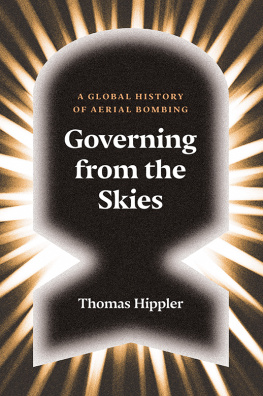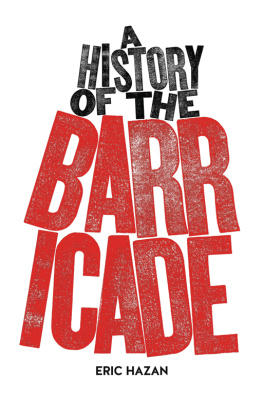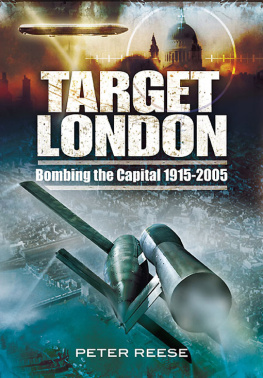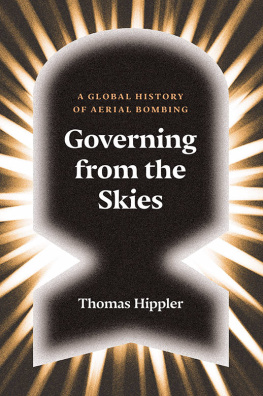Governing From the Skies
A Global History
of Aerial Bombing
THOMAS HIPPLER
Translated by David Fernbach

For tienne Balibar
Published with the support of the Triangle research unit
(UMR 5206 of the CNRS) and of Sciences Po Lyon

The translation of this book was supported by
the Centre national du livre (CNL)

This English-language edition published by Verso 2017
Originally published as Le gouvernement du ciel:
Histoire globale des bombardements ariens
Les Prairies Ordinaires 2014
Translation David Fernbach 2017
All rights reserved
The moral rights of the author have been asserted
1 3 5 7 9 10 8 6 4 2
Verso
UK: 6 Meard Street, London W1F 0EG
US: 20 Jay Street, Suite 1010, Brooklyn, NY 11201
versobooks.com
Verso is the imprint of New Left Books
ISBN-13: 978-1-78478-595-6
ISBN-13: 978-1-78478-598-7 (US EBK)
ISBN-13: 978-1-78478-597-0 (UK EBK)
British Library Cataloguing in Publication Data
A catalogue record for this book is available from the British Library
Library of Congress Cataloging-in-Publication Data
Names: Hippler, Thomas, 1972 author. | Fernbach, David, translator.
Title: Governing from the skies : a global history of aerial bombing / Thomas
Hippler ; translated by David Fernbach.
Other titles: Gouvernement du ciel. English
Description: New York : Verso, [2017]
Identifiers: LCCN 2016033495 (print) | LCCN
2016033523 (ebook) | ISBN
9781784785956 (hbk. : alk. paper) | ISBN
9781784785987 ()
Subjects: LCSH: Bombing, Aerial History.
Classification: LCC UG630 .H58613 2017 (print) |
LCC UG630 (ebook) | DDC
358.4/2409 dc23
LC record available at https://lccn.loc.gov/2016033495
Typeset in Sabon by MJ&N Gavan, Truro, Cornwall
Printed in the US by Maple Press
Contents
My thanks first of all to Nicolas Vieillescazes, not only for his support and encouragement throughout the writing of this book, but above all for the impeccable editorial work he contributed. Whatever people may say, publishing houses do still have editors! Several people have made it possible for this book to be born, each in their own way, and at different stages and moments. I particularly have to thank Jrmie Barthas for materialism in theory; Adila Benedjai-Zou for soft drinks and Sundays; Axel Berger for table tennis and revolution; Antje Bonhage for Berlin; Chiara Bottici for the radical Enlightenment; Aurlie Blanchard for art, architecture, and whisky sour; Sebastian Budgen for a mine of information; Benot Challand for New York; Grgoire Chamayou for patterns of life; Xavier Chatel for world politics and good meals; Antony Dabila for strategy; Thomas Deltombe for weapons; Franois Dumasy for Rome; Alexander Gumz for poetry; Isik Gurleyen for international relations theory and Turkey; Wolfgang Hardtwig for all his advice and support; Klaus, Petra, Annika, and Benjamin Hippler for their unfailing support; Vincent Jacques for overcoding and axiomatics; Oliver Janz for the invitation; Sara Jassim for graphic design; Razmig Keucheyan for his support and discussions on internationalism; Dieter Langewiesche for his criticism; Anne Lepoittevin for the razor and the latitanza; Chantal Malambri for Situationism; Nicola Marcucci for the title and for Berlin nights; lise Marrou for philosophy and the Loire; Sarah Mazouz for intersectionality; Acha Messina for Chile; Pino Messina for Umbria; Roberto Nigro for many things over many years; Vannina Olivesi for dance and sushi; Germinal Pinalie for a volcano of ideas; Hlne Quiniou for the art of formulation; Mathieu Rigouste for the arms industry; Kahena Sana for the pauses; Delphine Simon for theatre, wine, and all the good moments spent during the writing of this book; Arnault Skornicki for the social history of political ideas; Jrg Stickan for beer and literature; Hew Strachan for the First World War; Bo Strath for his kindness and benevolence; Savina Tarsitano for Calabria; Spiros Tegos for Athens; Julien Thry for his evenings; Benno Teschke for geopolitics; Chlo Thomas for translation and rocknroll; Milo Vec for peace; Jrme Vidal for friendship; Julien Vincent for technophilia; and Caterina Zanfi for the philosophy of war. My warmest gratitude here to them all.
Tripoli, 1 November 1911. I decided that today I would try to drop bombs from the aeroplane. No one had ever tried such a thing, and if I succeed I shall be happy to have been the first, Lieutenant Giulio Gavotti wrote in a letter to his father. The engineer from Genoa had obtained his pilots wings just at the time that the Italian government decided to embark on the conquest of a colonial empire in Libya. Gavottis record to date was limited to an unauthorized flight above the Vatican, which led to his detention for a few days, and to second place in a race between Bologna and Venice. But in late September 1911 things began to hot up in Libya: the Sublime Porte had refused to cede Tripoli and Italy declared war on the Ottoman Empire. Less than a week later, the city fell into the hands of the Italians. As a member of a small airmens flotilla, Gavotti was posted to Africa a few days after his twenty-ninth birthday.
At dawn on 1 November, Gavotti took off in his plane and headed for the Mediterranean. He had no specific mission order, but he did have a definite idea. He made a wide turn above the sea before heading for the small oasis of An Zara, some fifteen kilometres south-east of Tripoli, where he had noticed a troop of Arab fighters on an earlier reconnaissance flight:
I held the joystick with one hand, and with the other I untied the cord that held the cover of the box. I took a bomb from the box, which I placed on my knees. Transferring the joystick to my other hand, with the free one I removed a detonator from the small box. I put it in my mouth. I closed the box, placed the detonator in the bomb and looked down. I was ready. I was about one kilometre from the oasis.
The Ottoman army, caught unawares by the Italian aggression, met with considerable difficulties. So much so that Fethi Bey, the Ottoman military commander of the Tripoli region, decided to withdraw his troops and call on indigenous units to use guerrilla tactics. Gavottis task in Libya was to undertake strategic reconnaissance missions and keep the general staff informed of the manoeuvres of the enemy forces. But guerrilla fighters do not act like a regular army: they do not concentrate their forces in the same fashion, and can move among the civilian population like fish in water. In such conditions, strategic reconnaissance was completely useless and the Italian airmen had to invent new missions for themselves. Hence the initiative of Giulio Gavotti. It would have a long posterity.
Tripoli, 1 November 2011. NATO planes had stopped their bombing a day ago. The air strikes on Libya, which had begun on 19 March, ended on 31 October, one day short of a century since the very first bombing by plane. By a strange historical and geographical coincidence, the bombs launched by the NATO planes fell in the same places as those of Gavotti a hundred years earlier. History repeated itself, seeming to invite us to revisit a century of air bombardments. The historiography of air warfare, which has focused above all on the question of the legitimacy and utility of strategic bombing in the Second World War, finds it hard to take into account the importance of the colonial precedent, most often viewed as simply a dress rehearsal Yet the history of air bombing is full of this kind of geographical coincidence: the regions subjected to such bombing in the inter-war years particularly included Iraq, Syria, and the Indian north-west frontier: Afghanistan and the tribal regions of Pakistan.
















